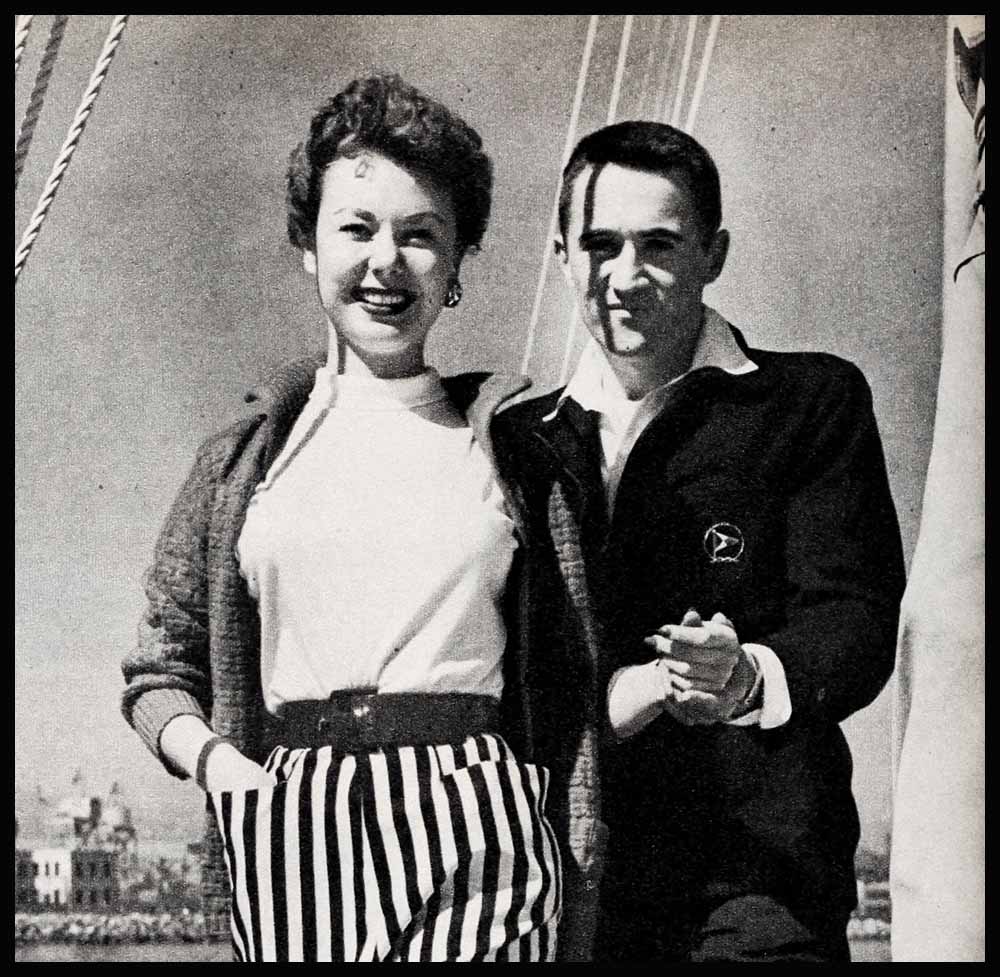
Pandemonium Reigned In Paradise
The warm months of 1954 were made notable in Hollywood social circles by a new parlor game entitled “When Will Mitzi Marry Jack?” Any number could play and no theory was considered too fantastic. One romance expert was willing to bet her food freezer that the Gaynor-Bean amour had long since chilled, was being reheated for publicity purposes. Another was coaxing along a hothouse full of orchids in preparation for white satin nuptials, and a third was positive that the love affair would end in a surprise flight to Las Vegas with Mitzi marrying someone other than Jack, and vice versa.
It is only fair to point out that Mitzi and Jack, too, were playing the game and with just as much concentration. However, they had one advantage. They knew what they were talking about. First, they were in love, had been since their meeting on February 9, 1953, when they were included in a party attending Harry Belafonte’s opening at the Cocoanut Grove. Next, they were going to get married. The problems started at that point.
One of the problems was the nature of the Hollywood romantic cliche. News, particularly that concerning dating, love affairs and their course toward altar or anvil, is so precious that Hollywood writers collect around the first discernible spark like prospectors around a fluttering Geiger needle. It’s a wonder that most Hollywood romances get started at all, considering how impossible it is to mine for uranium at Sunset and Vine.
Another problem was the heckling of Hollywood dreamers to whom a long engagement was admission of a low metabolism. The proverb of the headlong has always been: Marry in haste, repent with lawyer Jerry Giesler.
Finally, nobody seemed to take into consideration the character of the prospective bridegroom. Jack Bean (and don’t kid about his name; he’s heard all the jokes a thousand times) is not the Standard young-man-about-Hollywood. Born in Minneapolis, he was reared by parents who instilled the time-honored virtues in their son, one of which is the simple, unquestioning belief that a man does not marry until he is prepared to assume the responsibility of a household.
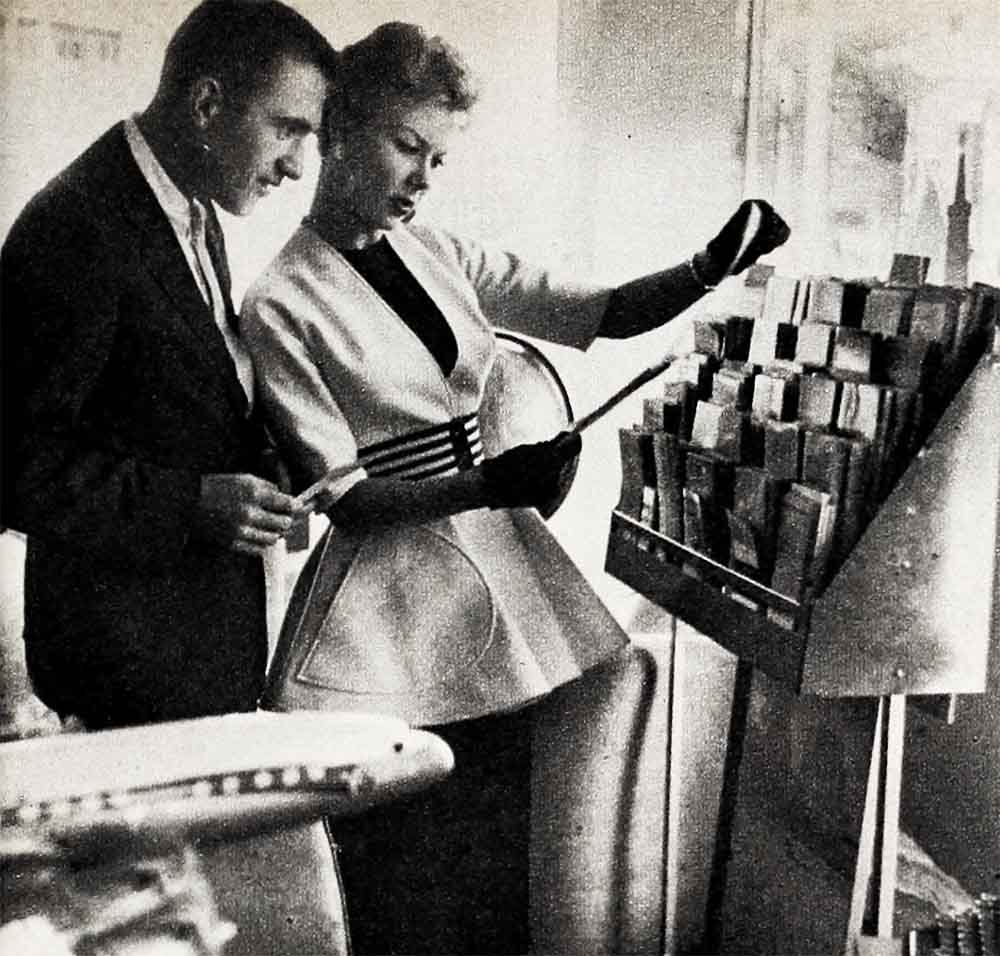
Jack’s college career (he had just been initiated by Alpha Delta Phi) was interrupted by the war; he served fifty-three months in the Army, lived through the Battle of the Bulge (to name only one experience in action), spent a year in Paris and a year in Vienna with the Army of Occupation. Returning to civilian life he earned his Bachelor of Science degree in 1948, following it with a M.S. in 1951 from USC. He worked for CBS and MCA before joining with Bob Rose to form Bean & Rose, Public Relations and Industrial Promotion, in 1954.
As it is for any new Corporation, the going was rough Make it “very rough.” They rented office space on a lease basis, paid the customary deposits, and set up a series of appointments. The ink was still damp on the datebook when a pair of burly gentlemen arrived to reclaim the furniture. A good deal of desk pounding was going on when explanation arrived in the form of the building owner.
Jack and Bob had not been dealing, as they thought, with this gentleman, but with a sublease who had failed to explain this simple fact before taking their money. The sublease had expired, the furniture payments had lapsed . . . so Bean and Rose transferred their business conferences to Booth 9, Beverly Hills Brown Derby.
Many of their clients and prospective clients were domiciled in the Midwest, so Bob Rose decided to invest some of the company’s Capital in a sales trip; in conference, Jack and Bob decided that Bob was the logical member of the firm to make the trip. He and the worst floods in years hit the Mississippi and Missouri basins simultaneously. Office after office was closed because staffers were unable to get to work; where offices were open they were manned by skeleton crews exchanging flood experience talk. Bob heard more versions of the “We’re interested, but not right now” postponement than you could stuff in Pandora’s box.
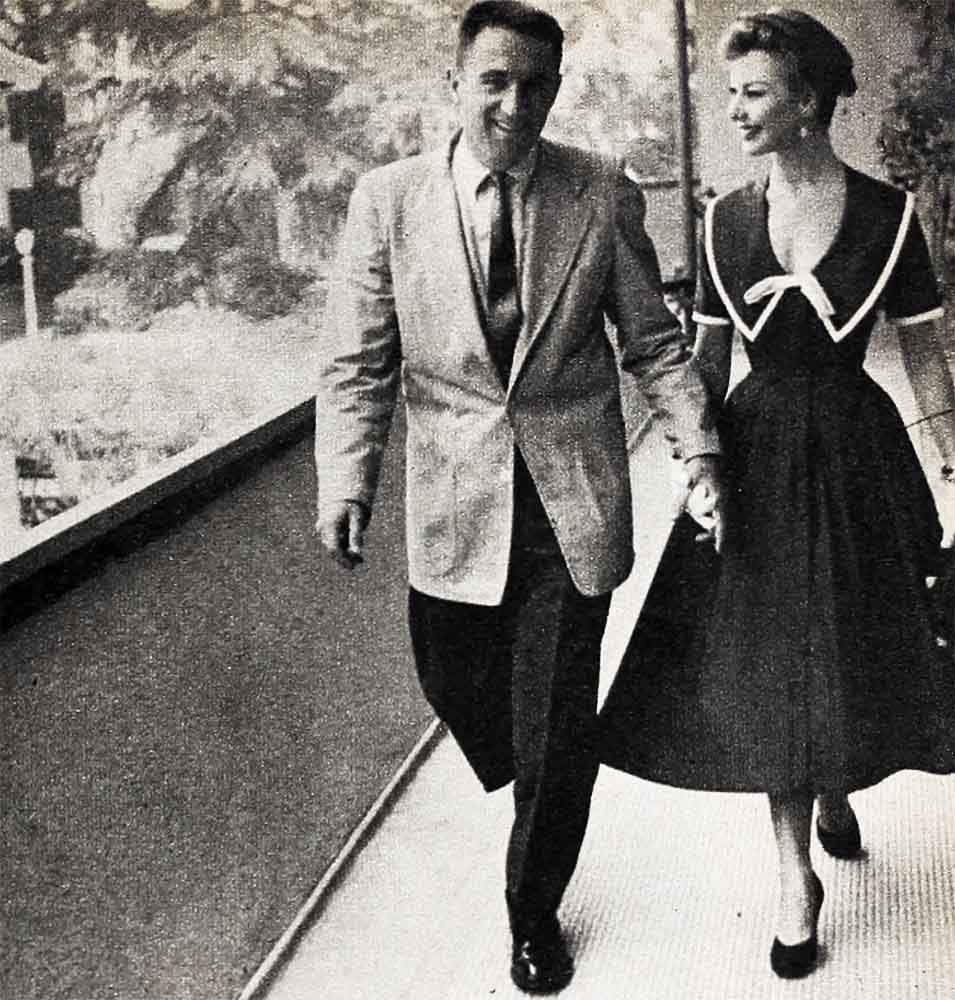
Meanwhile, back in Los Angeles, Jack was being put on the matrimonial spot every time he and Mitzi stopped at a drive-in for a hamburger. There was always someone to loom out of the darkness to ask if a wedding date had been set.
Offhand, no marriage counselor would suggest this sort of thing as seasoning for a bride, yet it worked out that way. Mitzi was learning. There were times when Jack would keep a date, giving every outward appearance of being composed and in normal good spirits, but would withdraw into some secret conference room as he and Mitzi drove along. At first she tried to question him, or to kid him out of his mood; a time or two she also tried silence. Nothing worked.
It took months for Mitzi to learn what a successful Mrs. Bean must know: Jack could not be cajoled, motivated or hurried. In his own good time he would begin to discuss his problem, but until that moment had arrived no outside influence could elicit his confidence.
There were other adjustments: Mitzi smokes; Jack doesn’t. Like all smokers, Mitzi will roam from room to room, depositing ashes in four to forty different ash trays. Like all non-smokers, Jack has the orderly inclination to empty the ash trays as rapidly as they have been used. Whether Jack was at Mitzi’s apartment, or Mitzi and a group of their friends were spending an evening with Jack, Mr. Bean made his appointed rounds.
Many a pair of newlyweds have had their first spat over exactly such a minor personality difference, but Mitzi and Jack had learned to take for granted one another’s behavior in this matter while they were still restrained by conventional courtesy. There is much to be said for getting accustomed to a foible before one feels he has a right to comment frankly on it.

Psychologists know now that one of the major matrimonial adjustments is necessitated by individual differences in peak hours of well-being. One person hits the deck at dawn and feels great. Another gets up reluctantly, doesn’t begin to live until mid-afternoon.
One of the first things Jack admired about Mitzi was that she was “a tremendous date, full of zest and vitality.” He had never seen her in pictures or on the stage, so his attitude upon meeting her was exactly that which he had brought to dates with hundreds of other girls. Inclined to be quiet, Jack delighted in Mitzi’s effervescence.
He was even more impressed with her the first time he called for her on a Sunday morning. At the time, Mitzi was living with her mother, had already prepared coffee “and was under full steam. She might have been shot out of a cannon. This seemed remarkable to me, because I don’t fight my way out of the feathers until noon.”
One of the most beautiful songs ever written is “Getting to Know You,” from “The King and I.” During the eighteen months of their courtship, Mitzi and Jack lived the lyrics “getting to feel free and easy when I am with you” and finding that “you are precisely my cup of tea.”
At this point two lovely things happened: the firm of Bean & Rose signed several highly satisfactory contracts and Mitzi completed one of the best roles of her career to date in “There’s No Business Like Show Business,” at 20th Century-Fox. The studio asked its singing-dancing-acting star to make a series of personal appearances in conjunction with eastern openings of the picture.
“The hand of Fate,” said Mitzi, who is not superstitious—just Hungarian.
“I’m not going to let you out of my sight for six weeks in the midst of New York’s winter when the wolf season is at its height,” said Jack, who is not jealous—just practical.
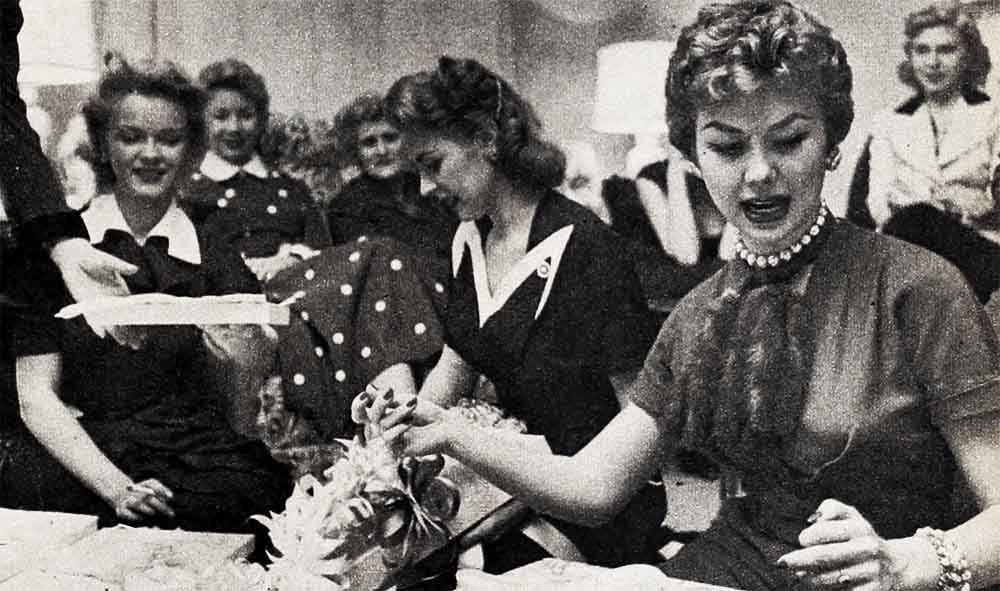
At this point we’ll have to peel back the calendar several years to the time when Mitzi was singing and dancing in the stage production “Jollyanna.” While the company was in San Francisco, Mitzi was given a copy of “Alice in Wonderland,” by Mr. and Mrs. W. H. French, who acknowledged themselves to be Gaynor fans.
Mitzi was so impressed by the unusual nature of such a fan gift that she wrote a warm note of thanks, which led to a meeting between Mitzi and her admirers. Mitzi fell in love with them They were urbane, mature people old enough to be her parents, even though they suggested almost at once that Mitzi call them Bill and Clara.
Bili and Clara joined Mitzi’s fan club in order to keep in close touch with her every career move and, whenever the Frenches were in Los Angeles or Mitzi was in San Francisco, Bill and Clara, Mitzi and her beau of the moment got together for dinner. Inevitably San Francisco became Baghdad by the Bay to Mitzi, a romantic and fabulous city transporting delight and adventure on its many winds Also, inevitably, Jack Bean met Bill and Clara and was given the French seal of approval.
“When you two decide to get married, let us know,” they said. “We want the ceremony performed in our living room.”
Overwhelmed, Mitzi thanked them but explained that time, distance, confusion, families, studio policies and so forth would prove to be terrifying troublemakers. “I wouldn’t think of causing you so much difficulty.”
Yet, when a wedding seemed possible, Mitzi and Jack talked it over and concluded that for true romance, for loving-kindness and for a wedding unmarred by those undercurrents of antagonism that create problems for the famed, there was but one perfect place: Bill and Clara French’s San Francisco living room. Mitzi telephoned to the effect that it was time to kill the fatted calla lily and set the date as November 18, 1954.
Yvonne Ruby and Bob Rose were asked to serve as witnesses, a few additional close friends and relatives went along and the traditions were observed As “something old,” Mitzi carried the rose point lace handkerchief carried by the mother of Mrs. French on her wedding day; as “something new,” Mitzi wore handmade lingerie; for “something borrowed,” she cajoled 20th Century-Fox into loaning her the pale blue woolen suit adorned with a pale blue fox cape-collar and the matching blue horsehair hat that Mitzi had worn in “Show Business”; for ‘something blue,” she wore the traditional blue garter. For luck she wore a penny in her shoe.
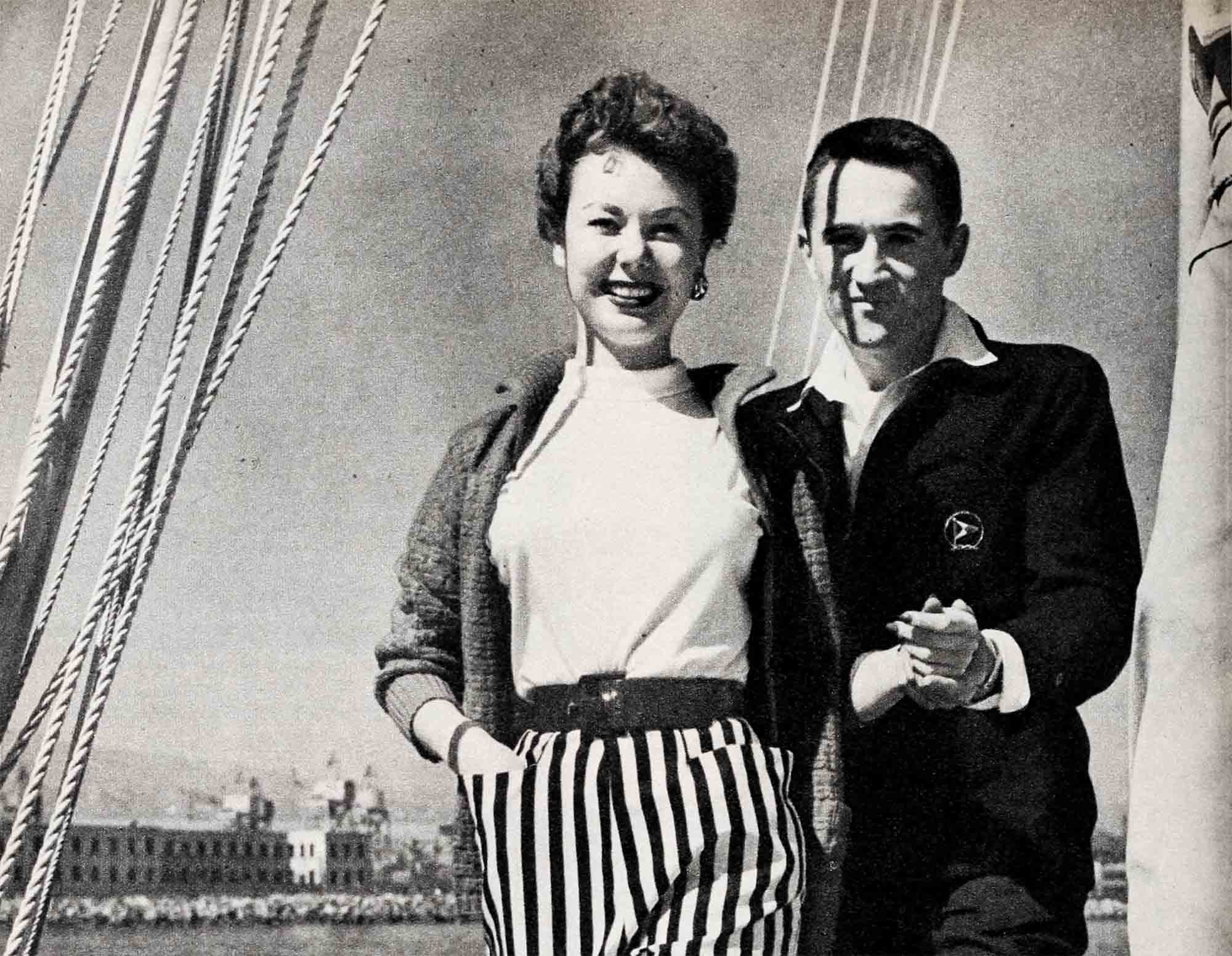
Standing before the flower-banked fireplace at 12:35—just past noon as the minute hand of the clock started its lucky upward sweep-Mitzi and Jack exchanged vows and Jack placed the engraved gold band on Mitzi’s finger.
At this point the bride uttered a small gasp and murmured in a mildly stricken voice, “But there’s another ring. There’s one for Jack, too.”
The magistrate paused. He considered. “A double ring service, hmmm? Well, we’ll have to start again at the beginning.”
This incident crowned Mitzi’s nuptials with the happy status of the unique in Hollywood. Mercurial as matrimonial habits are supposed to be in the film colony, Mitzi is the first bride ever to take a second husband within thirty seconds of having acquired the first, simultaneously satisfying those who maintain that the only truly happy marriages are the original matings and those who insist that second marriages offer the best chance of contentment.
A champagne breakfast was celebrated at the Garden Court of the Palace Hotel, and that evening Mr. and Mrs. Jack Bean emplaned at 9:30 for New York. Observed Mitzi, “When we reach New York, everyone is going to say that–as newlyweds—we came out of the clouds and down to earth in record time.”
Come out of the clouds they did: the clouds dumping tons of water onto New York. Mitzi, in her honeymoon suit, was drenched before she could rush from plane to terminal, and during the ensuing week she was to ruin two more of her shining new honeymoon outfits. “It’s lucky,” she insisted valiantly.
The Beans checked in at The Plaza, a sentimental journey because Mitzi—during her early eastern dancing days—used to yearn over the plush hotel as youngsters will and promise herself that someday, someday, she would be one of the perfumed and befurred golden girls who swept along the Plaza’s resplendent corridors.
Before the Beans had ordered ice water, the calls began to come in; flowers and telegrams began to arrive every few moments. It was altogether fabulous. Together Jack and Mitzi read the messages. Among them was a communique from Los Angeles explaining that a minor problem had arisen The house they thought they had leased, having given a check for the first and last months’ rent, had been taken off the market. The owner had decided not to lease.
“Oh well—I can always move into your apartment, or you can move into mine,” Mitzi said. “Lucky that we planned to leave our belongings in our apartments until we could get home and supervise the moving ourselves-think what a mess if our stuff had been sent to that house. . . .”
Jack agreed that a little thing like no future housing should not be allowed to cloud a honeymoon.
The following morning they received a call from Los Angeles. Bob Rose had a scoop for them: Mitzi’s landlady had rented her apartment. A very desirable tenant had come along and the landlady was afraid that if she waited until Mitzi returned the tenant would have gone elsewhere.
“It’s okay,” said Mitzi. “I’ll move into Jack’s apartment.”
Later that day Jack asked dreamily, Mitz, how many pairs of shoes do you own?”
“Not as many as I did when I left home,” said Mitzi, referring to the evening slippers ruined by the New York rain. Both she and Jack knew that her answer was a diversion and that eventually Mitzi’s footwear would be stacked like cordwood in the living room of Jack’s apartment unless their west-coast living arrangements could be improved.
‘Oh well, I can always carry my wardrobe in a carryall bag in my car, I suppose,” said Jack.
The following morning there came another call from Los Angeles. Jack’s partner wanted to know the name of Jack’s automobile insurance carrier. “Nothing serious,” he said. Just a little wreck—car would be in the repair shop for a week, maybe ten days. Nothing to worry about.
“There went my wardrobe closet,” said Jack.
The fourth day both honeymooners winced when the telephone rang in unmistakably long-distance tones. “Nothing more can happen,” reasoned Mitzi.
“One thing,” corrected Jack. “A perfectly dandy tenant could have come along to rent my apartment.”
This was Mitzi’s first indication that her spouse was psychic, and she could have gone on indefinitely without the revelation. What could be done with Jack’s possessions? They might be stored in the basement until he returned. Too bad he wasn’t there, on the spot, because—said the caller—there was a two-bedroom apartment available. “I’ll take it,” said Jack. “Just dump everything in there for the time being, and perhaps you could make arrangements to have Miss Gaynor’s, I mean Mrs. Bean’s things moved, too.”
This happened, appropriately enough, the day before Thanksgiving, providing ample cause for celebration. For years Jack had heard glowing stories about Stonehenge Inn, Connecticut, so it was there that he and Mitzi had their first married Thanksgiving dinner.
Another memorable event took place in New York upon their return. Ethel Merman, whom Mitzi had met and grown to love during the shooting schedule of “Show Business,” gave a stupendous party, honoring Mitzi and Jack, at the Stork Club, and Mitzi realized the secret thrill of every girl on earth: She danced with the Duke of Windsor.
From New York the Beans went to Detroit, then to Minneapolis where they visited with Jack’s family and on to Denver where they spent four wonderful days with Ethel Merman and her husband, Bob Six, on Six Acres (which, they like to point out, consists only of 5.7 acres).
Dropping down into Los Angeles two days before Christmas proved to be somewhat overwhelming. The Clarion sunlight and shining green trees after the storms and barren trees of the East seemed unreal.
“I feel as if I should be hearing the orchestra starting the overture to some fabulous production in which I am playing Sleeping Beauty in the South Seas,” Mitzi admitted, a little dazedly.
The daze was increased when Mitzi and Jack were ushered into their new apartment. Pictures were in place and lamps were connected. There was salt in the salt cellar and sugar in the bowl, as well as cream in the refrigerator. Mitzi and Jack’s friends had moved the Beans, record collection to Scotch Tape.
“Of course, it was impossible to get into any of the closets,” Mitzi remembers. She gave away thirty pairs of shoes (Jack had long since learned that his wife’s pet extravagance was footwear), two dozen sweaters and eighteen dresses. Jack still insists that he stripped down his own wardrobe to the point where the only social function he could have attended was a costume party, and he would have had to appear there as Gunga Din.
The following morning the Beans rolled out before the smog had descended and drove to Beverly Drive in Beverly Hills, armed with lists. The date was December 24 and neither had purchased a single Christmas gift. Jack took one set of names and Mitzi took another and for several hours they passed one another with time only to exchange a nod.
While Mitzi and Jack had been in New York, Mitzi had admired a festoon necklace in the window of Bergdorf Goodman. Repeatedly Jack had tried to slip away long enough to buy the costume jewelry, but it had been impossible. He had thought of writing, wiring, or—as time ran out—telephoning, but gave up in belief that the necklace must have been sold.
While wandering around Beverly Hills that morning, Jack spotted a duplicate of the necklace in a velvet window and promptly bought it. He encountered Mitzi twenty minutes later and his triumphant expression inspired the little wife to demand, “Have you finished already? Where are all your packages? What’s with you, anyhow?”
“Merry Christmas, Mitz. See you later when you’ve accomplished a little more. Personally, I’m doing fine. Holly, anyone? Mistletoe? Christmas trees?”
As it turned out Mitzi managed her own shopping very well, to with cuff links, a cashmere sport coat, matching sox, several books, etc., etc.
As 1955 arrived, good fortune caught up with the Beans, making up for that Awful Week. Mitzi signed to star in “You’re the Top,” at Paramount, and Jack’s company added a brace of smart new clients.
Of course the honeymoon adjustments continued: Jack learned that Mitzi’s idea of the perfect remembrance was an armload of violets. Mitzi learned that Jack loved wine cookery, a result of his years in Europe. She also learned to live with what Jack labels “The Bean Filing System.” Each evening he unloads his pockets when he changes into leisure clothing. The next morning he returns to his pockets only those things he really needs for that day. The rest remains on the corner of his dresser.
“If that stuff should fall on anyone, it would crush the victim,” volunteered Mitzi, studying the mounting monument.
While attempting to straighten some of the stacks, she came across a vividly colored folder describing Geneva and wanted to know what that was all about.
Jack said he had picked up that folder and a second similar one at a local travel agency; one described Geneva “the loveliest city in the world” and the other described Salzburg. “Two of the dozens of places in the world I want to take you, Mitz,” he explained.
“Guess I’ll start my own filing system with these,” she murmured. “They’re worth keeping.” For several moments she pawed through drawers trying to find a place in which to store them, gave it up, stacked the folders on the corner of her dresser. “The Gaynor Filing System,” she said, grinning.
The adjustments continue between Hollywood’s happiest honeymooners, and undoubtedly will go on for the next fifty years or so. We’ll keep you posted.
THE END
It is a quote. PHOTOPLAY MAGAZINE JUNE 1955




